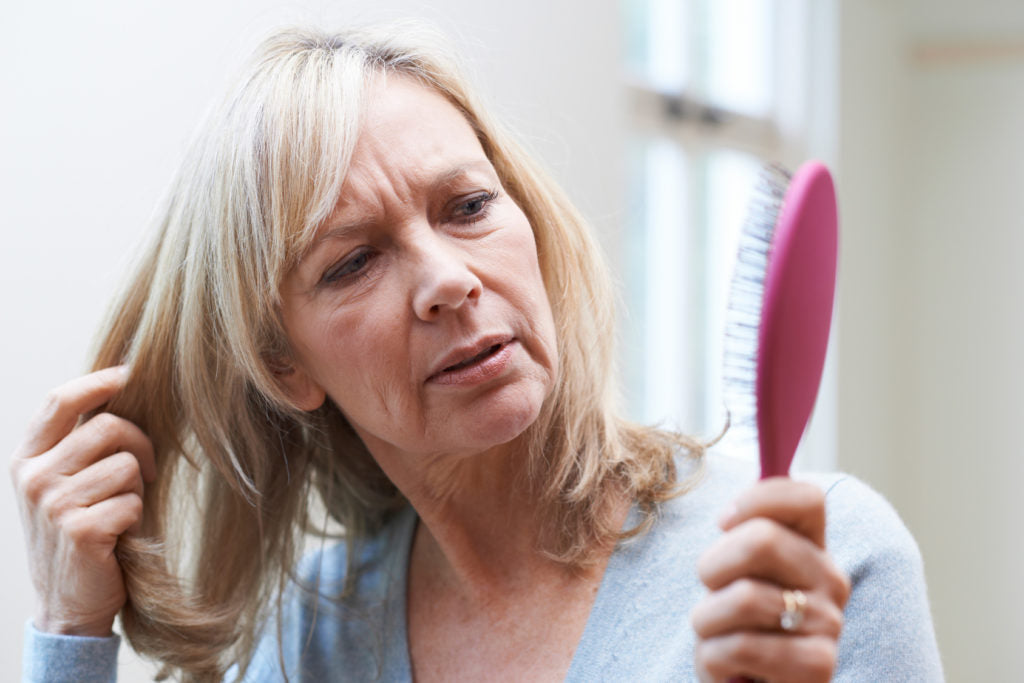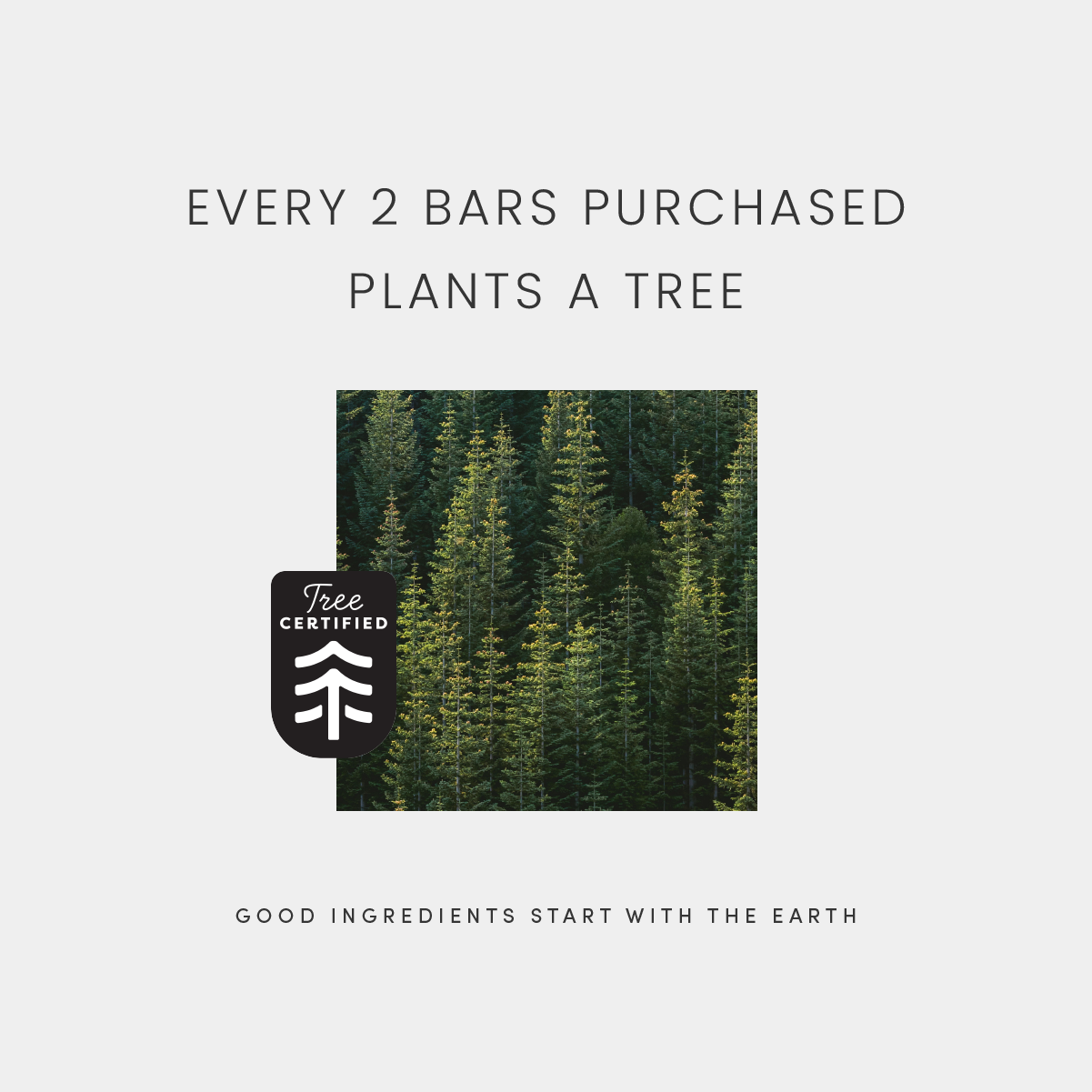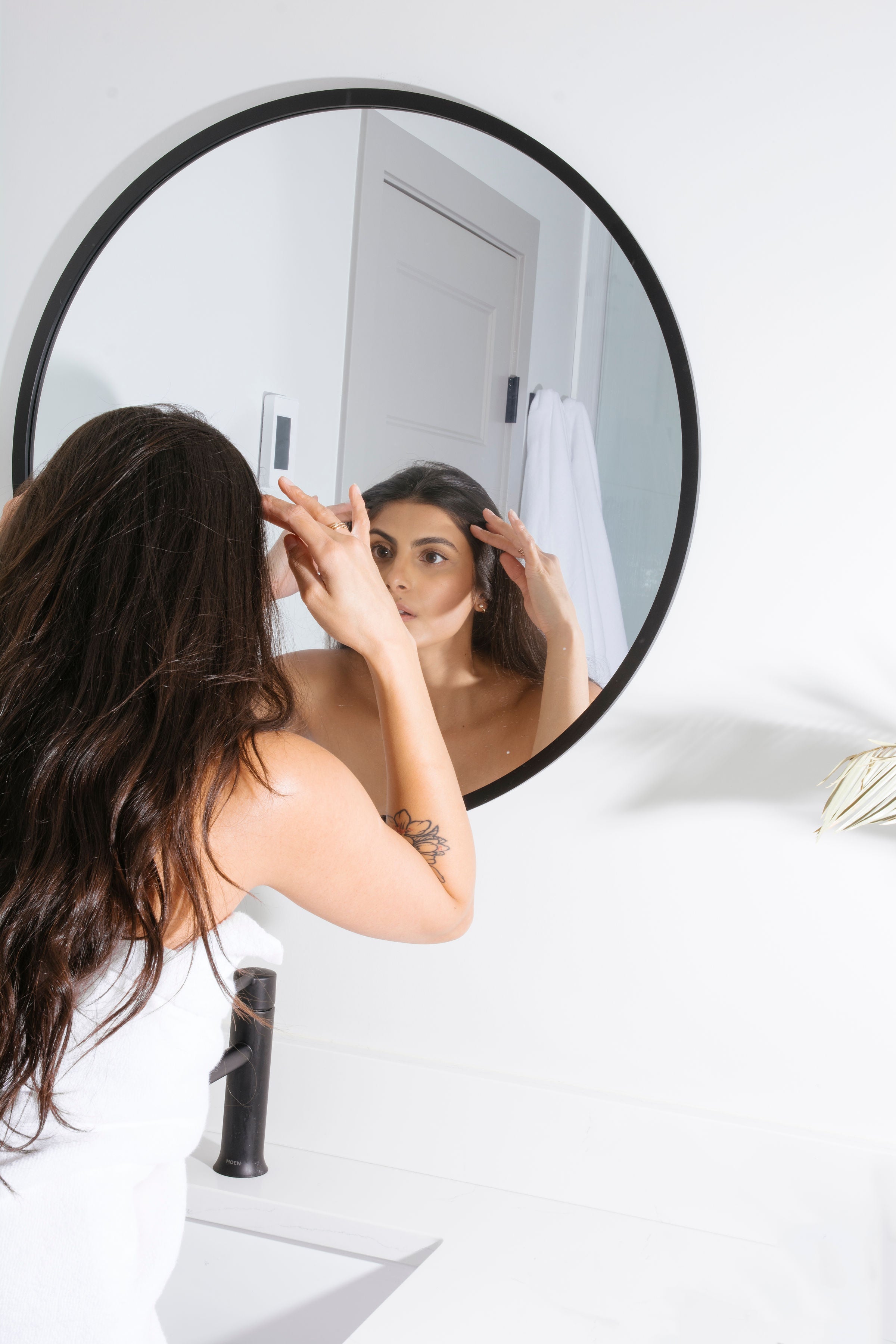
What do Postpartum and Menopausal Hair Have in Common?
You might not think there is a direct correlation between our childbearing years and menopause, but there is. During both life phases women experience fluctuations in their reproductive hormones. These hormonal shifts are what can cause many women to experience hair loss and thinning.
What happens during postpartum to cause this hair loss?
The average person loses approximately 100 hairs per day. However, when you are pregnant the rise in HCG (Human Chorionic Gonadotropin), estrogen and progesterone hormone levels prevents hair loss; leaving most women to experience fuller, thicker hair.After a mother gives birth these hormones begin to drop off. This sudden drop in pregnancy hormones is what causes many women to start experiencing hair loss in clumps. This phase can happen anywhere from 1-6 months postpartum. Mothers who nurse tend to notice it more as they wean the baby to solids.
What happens during menopause to cause hair loss and thinning?
The delicate balance of estrogen, progesterone and testosterone play an important role in healthy scalp and hair growth. Just like after we have a baby, during menopause our estrogen levels drop. This decline in estrogen production can cause many women to experience hair loss or thinning.What can you do to reduce the severity of postpartum and menopausal hair loss or thinning?
In both cases we need to look at ways to stimulate healthy hair growth, reduce hair fall and enhance volume and body. Which means getting adequate nutrition, increasing blood flow to the hair follicle and regaining normal hormone function.Use a Volumizing Shampoo
Only shampoo as needed; most people experience most of the hair fall when washing their hair. Use a good conditioner, this will help reduce friction and allow you to detangle easier, reducing breakage and excessive hair fall.In the Awaken line we use a variety of different ingredients to stimulate circulation, enhance body and encourage hair density for fuller looking hair. Peppermint and rosemary stimulate circulation on the scalp helping increase blood flow to the hair follicle. In a research study involving mice, lavender was shown to stimulate new hair growth. Which is why we make the lavender infusion fresh, so the extract is more bioavailable and effective in the final formula. Quinoa and rice proteins are added to promote stronger denser hair and pro vitamin b5 adds shine, body and bounce.
Exfoliate
When you do wash make sure you are exfoliating the scalp. Exfoliating your scalp can remove oil, product buildup and increase circulation to the hair follicles. This is essential for healthy hair growth, if the follicles become clogged or don't have adequate blood supply it can cause hair loss and thinning. You want to do everything possible to encourage new hair growth.Avoid Styling
The beauty about using The High-End Hippie shampoo and conditioner bars is that most people find they can wash and go without needing to style it. This is extremely beneficial if you are going through hair loss as a result of postpartum or menopause. Heat and over brushing can contribute to more damage, breakage and hair shed. Try turning down the heat when you do style the hair and opt for hair accessories like clips and scrunchies instead of elastics. If you can, avoid chemical hair treatments like coloring, perms or straightening; this will help reduce stress on the hair.Eat a Balanced Diet
Diet plays an important role in hair health. If there is a nutrient deficiency the hair is one of the first places you will start to see signs.Hair loss and thinning can all be symptoms of iron, zinc, b vitamin, and amino acid L-lysine deficiency. Vitamin C prevents hair damage and supports collagen production, vitamin A protects the hair follicle and aids in the production of sebum, vitamin E protects the hair follicle against oxidative stress, folic acid helps promote new hair growth and omega 3 fatty acids maintain lustre and shine.
Here are some foods that can help promote healthy hair growth:
Green TeaSunflower seeds
Brazil nuts
Walnuts
Fatty fish
Eggs
Sweet potatoes
Spinach
Broccoli
Flax seeds
Chia seeds
Spirulina
Beans
Lentils
Reducing Stress
What doesn’t stress affect? Stress can deplete your B vitamins and cause hair loss. A research study from Harvard showed lab rats that were given corticosterone, an adrenal stress hormone, had reduced hair growth. Finding ways to help manage stress levels can help improve your chance of returning your hair to its former glory. Try daily meditation, yoga, deep breathing and being in nature.Balance your Hormones
In the case of postpartum don’t worry, as your hormones start to balance out your hair fall cycle will return to normal. If you are not noticing an improvement, talk to your doctor, naturopath or herbalist about ways to balance your hormones.
During menopause this will not correct itself if your hormones stay out of balance. Talk to your doctor, naturopath or herbalist about ways to balance your hormones and support your estrogen production.
At The High-End Hippie we believe that beauty and wellness are one in the same. If there is an internal imbalance our hair and skin will be one of the first places symptoms will appear. Taking a holistic approach starting with lifestyle and diet will be one of the first steps in addressing hair loss/thinning.




Leave a comment
This site is protected by hCaptcha and the hCaptcha Privacy Policy and Terms of Service apply.